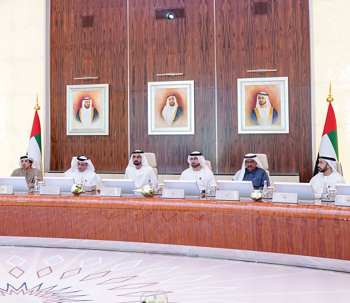Media Center
UAE Cabinet reviews Emirati School Model progress
The UAE Cabinet, chaired by His Highness Sheikh Mohammed bin Rashid Al Maktoum, Vice President, Prime Minister and Ruler of Dubai, reviewed the progress of the Emirati School Model.
The meeting was also attended by H.H. Lt. General Sheikh Saif bin Zayed Al Nahyan, Deputy Prime Minister and Minister of the Interior, and H.H. Sheikh Mansour bin Zayed Al Nahyan, Deputy Prime Minister and Minister of Presidential Affairs.
The UAE government has allocated AED5 billion to invest in state-of-the-art infrastructure for the UAE schools over the period of six years.
The Emirati School Model is implemented in 800 public and private schools across the UAE to prepare generations capable of leading the future of the UAE, and to achieve the objectives of UAE Vision 2021 and UAE Centennial Strategy 2071.
The Emirati School Model was launched as an innovative concept to advance the education system in the UAE in order to achieve the objectives of the national agenda and its objectives through various educational resources of knowledge, skills and languages.
Currently, there are more than 9,000 students learning Chinese and French in the UAE schools. The model aims to implement international standards that meet the needs of the job market, through a modern curriculum that offers different educational fields, as well as a focus on student recreational activities to enhance the knowledge, skills and personalities of school students.
On a different note, the Cabinet also adopted the Federal Law on Senior Emiratis as an integrated care system to ensure a decent life for them and at the same time to ensure their active participation in the society.
The law covers their health, treatment, rehabilitation, services, and rights.
The Cabinet adopted an amendment to the provisions of the Commercial Agencies Law to allow local agencies to become public shareholding companies in order to ensure their competitiveness and sustainability and enhance the economic performance in the Emiratis enterprise sector.
The decision also contributes to the inclusion of more companies in the capital markets of the UAE and encourages citizens to venture in business or invest in public shareholding companies.
The UAE Cabinet approved linking the payment systems among the Gulf Cooperation Council countries with the monetary institutions and central banks, and approved as well the formation of the Foreign Direct Investment Committee, chaired by the UAE Minister of Economy and the membership of representatives of related government agencies.
The Committee will assess the foreign direct investment applications and work towards attracting further for foreign direct investment in the UAE.
The Cabinet also adopted a federal law on the regulation and possession of dangerous animals in order to ensure that the community is protected from any harm caused by these animals and from diseases that can be transmitted to other animals.
The law also ensures that dangerous animals receive appropriate care at specialised centres.


